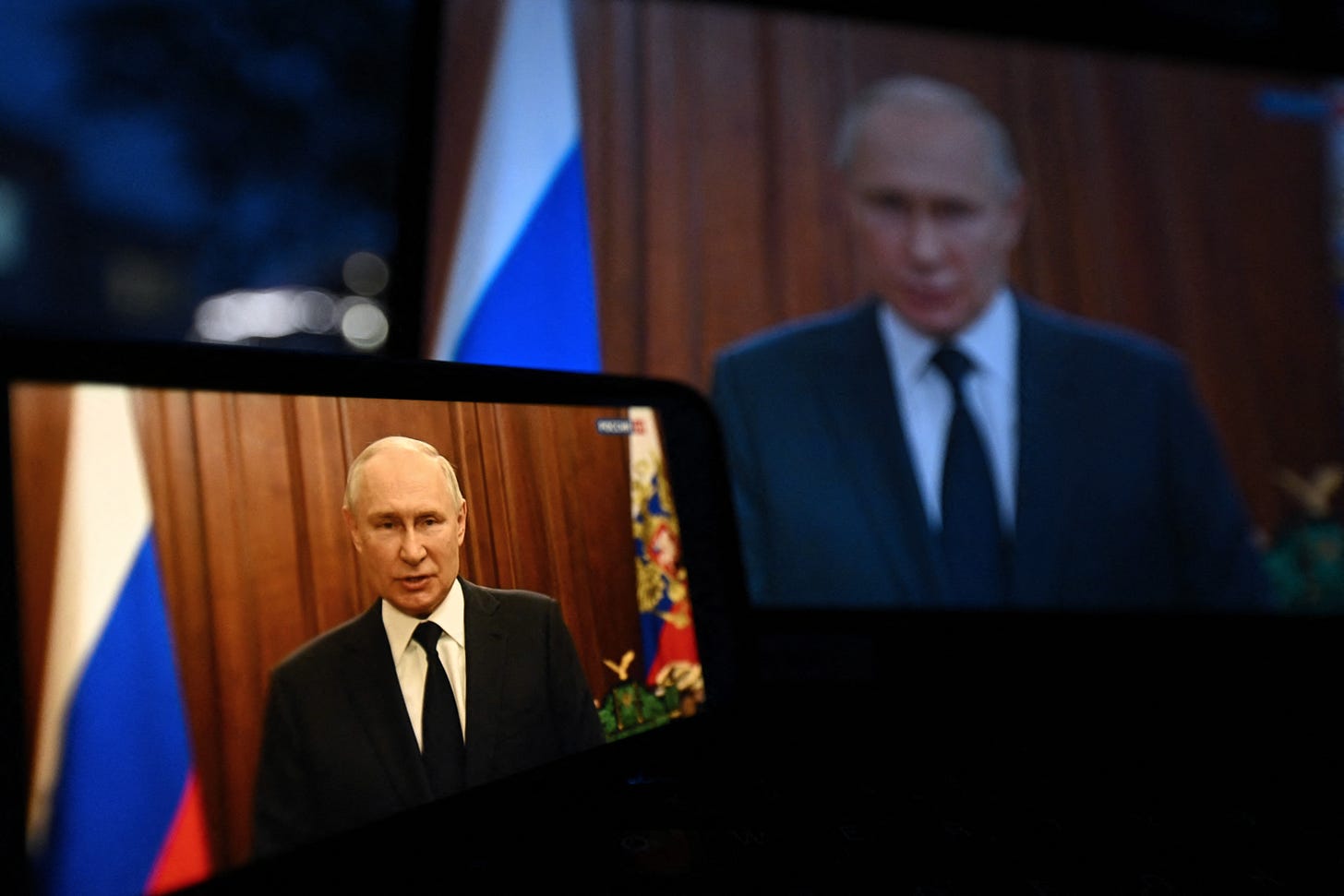Putin Is More Dangerous than Ever
Things in Russia are about to get much worse in the wake of the failed Wagner march.

“You come at the king, you best not miss,” said Omar, the legendary outlaw in the equally legendary series The Wire. Maybe Yevgeny Prigozhin didn’t watch The Wire. Maybe he should have.
Like the gangsters Omar made a habit of robbing, Vladimir Putin runs an empire built on fear. The certainty of violent retaliation plays, in systems like Russia, the functional role that law plays in the West. It’s the glue that holds the whole thing together, the basic principle at its core. In autocracy you do what you do because you fear the man above you, who does what he does because he fears the man above him, and on and on in an unbroken chain to Vladimir Putin’s office.
This form of personalism is the one element of continuity in Russia’s history, dating back to the days of the tsars. In a country that never quite got the knack for the rule of law, the top spot in the chain of terror passed seamlessly from tsar to general secretary to president without ever being quite reformed. Laws exist, to be sure, in a system like this, but their role is ornamental at best, instrumental at worst. As one Latin American caudillo put it to describe very much the same system of government: “to my friends: everything! to my enemies: the law!”
This is how things in Russia work—or, well, “work.” Things remain together, just, but only so long as everyone fears Putin most. And that’s why last weekend’s bizarre mini-crisis in Russia has destabilized the Putin system as consequentially as it has.
For one fleeting moment, just one mad-cap afternoon, Vladimir Putin was not the man Russians feared most. On Friday, following months of tensions among the Russian military leadership, Prigozhin, the leader of the Wagner mercenary group fighting in Ukraine, announced an audacious march on Moscow. The next day his forces filed through the southern city of Rostov-on-Don and allegedly made it within 120 miles of the capital.
The aura of menace built so carefully over so long crumbled in plain view of the entire world as rumors swirled of a panicked Putin hopping on a plane leaving Moscow. In a system built on fear, that right there is the very definition of a constitutional crisis.
But Prigozhin went for the king, and he missed. Worse, he never took a shot at all. In a matter of hours, the Wagner Group had withdrawn amid reports of a deal being brokered allowing Prigozhin to flee to Belarus.
Where does that leave Russia? Well, in the primate dominance dance that passes for elite politics in Russia, it leaves the entire power structure destabilized. In a state that relies on the leader’s menace for its stability, rebuilding stability means rebuilding that sense of menace.
Which is why, I fear, the weeks ahead could be uniquely brutal.
Putin, we’re told, spends a great deal of his time in fear of assassination. Those fears will have been multiplied a thousand fold over this last weekend. Because the math isn’t hard, and the calculus isn’t particularly sophisticated. Having sensed vulnerability, those who secretly harbored dreams of making a move against Putin from within the system will have had their calculus upended. Challenges that were fully unthinkable will have become at least partially thinkable. After all, Prigozhin thought them. And very nearly brought them off. He even survived.
The resulting state of affairs is very far from acceptable for Putin. The level of threat he now feels he faces must be intolerable. And the mechanism he’s most likely to turn to in order to reverse the situation is as straightforward as it is appalling.
Vladimir Putin now faces the imperative need to cause others to fear him more.
And this is the one thing he’s good at. We’re talking, after all, about a man who has spent his entire adult life studying the art of provoking fear. In a furious address on Monday afternoon, he announced that “any kind of blackmail is doomed to failure,” vowing to bring the organizers of the uprising to justice.
Inside the military and the security services, the search for scapegoats will be intense. Those judged to have been responsible for allowing the weekend threat to blossom can expect little mercy. In Ukraine, as well, Putin’s capacity to inspire fear is reaching lows that are incompatible with the success of his campaign. This is intensely threatening to him, and stepped up brutality across the Ukrainian front is to be expected.
As for Prigozhin himself, I find it impossible to imagine he can expect a long, comfortable Belarusian exile. The guarantees that needed to be extended to deal with the most acute moment of crisis are unlikely to prove long lasting, especially after his Wagner Group mercenaries have been disbanded as an effective force. What sane actuary would issue a policy on this man’s life? At what price?
For Vladimir Putin to survive in power he will need to patch up the holes in his now badly tattered aura of menace. I can’t tell you exactly how he’ll do that. But I can tell you this: it’s going to be ugly.
Francisco Toro is a contributing editor at Persuasion. His Substack is Solid Reality.
Follow Persuasion on Twitter, LinkedIn, and YouTube to keep up with our latest articles, podcasts, and events, as well as updates from excellent writers across our network.
And, to receive pieces like this in your inbox and support our work, subscribe below:






Few people in the West seem to have much insight into or understanding of what happens in Russia. Francisco Toro being no exception.
Putin remains popular in Russia. The number one song in Russia today is “I am Russian”, a defiant, upbeat patriotic rock anthem. Prigozhin has landed on his feet in Belarus and is now much closer to Kiev than ever with his troops. I’m honestly curious, do you even follow news from Russia? Or does all your information come from your ideological fellow travelers and old American crime series?